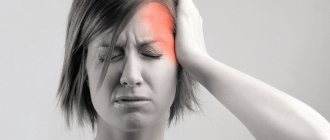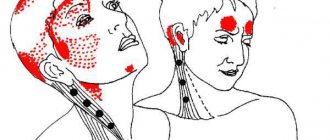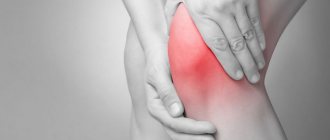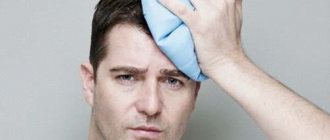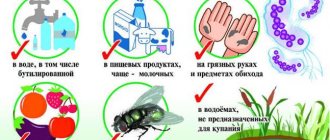What Can Cause Tension Headaches?
The true reasons for the development of tension-type headache have not yet been clarified, but doctors have identified two provoking factors.
Mental stress
We are talking about a chronic stressful condition, which is accompanied by severe muscle tension. During such tension, compression of the blood vessels located in the thickness of the muscles occurs, which leads to disruption of metabolic processes. It is precisely this “mechanism” of development of the problem that provokes a severe headache - this is a signal that something needs to be done to prevent the development of serious pathologies of a neurological nature. In this case, you need to remove the stress factor.
Incorrect ratio of pain and anti-pain impulses
This problem occurs with frequent anxiety, anxiety, and depression, which cause disturbances in the functioning of mediators. This situation ends with a decrease in the threshold of pain perception, and the person experiences severe headaches from any even minor touch.
Doctors do not separate these two provoking factors, since they are always interrelated. The described condition in almost every case is associated with hypochondria, neuroses and asthenia.
Treatment
Medications
The goal of drug treatment is to relieve pain and eliminate its cause (muscle spasm). Medications that improve mood and relieve anxiety are also used.
Ibuprofen is the drug of choice for pain relief. Ibuprofen helps get rid of unpleasant sensations faster and more effectively than other similar pills (Aspirin or Paracetamol).
Ibuprofen is sold under different names - Ibufen, Brufen, Next, Nurofen. They do not differ in price and quality, but capsules and syrups begin to act earlier than regular tablets.
Ibuprofen should be taken only after meals to protect the stomach from irritation. Take 1 tablet (200 mg) once, until the pain stops. If necessary, you can increase the dose, but take no more than four tablets per day. Ibuprofen should not be taken for more than one week.
Excessive, unjustified use of painkillers can intensify further attacks of cephalalgia and lead to the development of a chronic form of tension-type headache, abuse headache (paradoxical headache that worsens in response to taking an analgesic).
"Novo-Passit" - this medicine contains only herbal ingredients: extracts of valerian, lemon balm, St. John's wort, hops, hawthorn. Novo-Passit is suitable for people who want to relieve headaches without chemicals. It calms, uplifts, relieves spasms of muscles and blood vessels and relieves pain. Taking the drug is relevant for headaches caused by stress, psycho-emotional tension.
"Novo-Passit" should be taken 1 tablet 3 times a day. "Novo-Passit" in the form of syrup is taken three times a day, 1 measuring spoon. Since the syrup contains sugar, it is not suitable for diabetics. You can use Novo-Passit daily for 3-4 weeks.
Amitriptyline is an antidepressant that improves mood, relieves anxiety, and also relieves pain. Amitriptyline (Saroten) is the drug of choice for the treatment of chronic and frequent episodic tension-type headache. Like other antidepressants, it is available by prescription only.
Start taking Amitriptyline with a dose of 10 mg per day during the daytime. Every week the dose of the medicine is increased. You should stop at the lowest dose that helped alleviate the person’s condition. As a rule, 1-2 tablets per day are enough. Treatment with Amitriptyline lasts at least six months.
Doctor's advice
Changing the position of the head, light self-massage of the neck and back of the head in the form of stroking and rubbing can help relieve tension headaches. Chronic tension headaches associated with stress require the use of sedatives, which can be herbal.
Victoria Druzhikina Neurologist, Therapist
Taking Amitriptyline is contraindicated for people suffering from glaucoma (consult an ophthalmologist), peptic ulcers, and patients with heart rhythm disorders (consult a cardiologist). People with heart disease should have an electrocardiogram performed regularly while being treated with this drug.
"Venlafaxine" - this antidepressant is used if treatment with "Amitriptyline" has not brought results. It is sold under the names "Efevelon", "Velafax", "Velkasin". Start taking Venlafaxine 1 tablet (37.5 mg) twice a day. If necessary, you can later switch to 75 mg tablets.
People with high blood cholesterol levels, as well as those who suffer from arterial hypertension, should take this drug with caution. You should definitely notify your doctor about hypertension.
"Afobazol" - this medicine will relieve anxiety, nervous tension, weakness and fatigue. Afobazole is suitable for people whose pain is caused by an anxiety disorder or chronic stress.
This is a mild drug that does not cause side effects. Take Afobazol three times a day after meals. The course of treatment takes 3-4 weeks.
Alprazolam or Xanax is a strong anti-anxiety drug that relieves excess stress and anxiety and has an antidepressant effect.
For HDN, Xanax is used at a dose of 2-3 mg per day. Treatment takes 6-8 months. After completing the course of treatment, the drug should be discontinued slowly, gradually reducing the dosage.
Sirdalud (Tizanidine) relaxes overstrained muscles. This medicine is taken in a dosage of 2 to 4 mg 2 times a day. The course of treatment lasts up to 2 weeks.
It should be borne in mind that Sirdalud can cause severe drowsiness, so you should not drive while taking it.
Tolperisone or Mydocalm is another medicine that relaxes muscles. Its advantage is that it has an anti-anxiety effect, therefore it immediately affects two factors that cause tension-type headache.
Starting from 150 mg per day, the dosage is gradually increased to 450 mg (1 tablet three times a day). The full course of treatment with Mydocalm takes up to 2 weeks. "Mydocalm" and "Sirdalud" are not prescribed to people driving vehicles due to decreased attention and muscle relaxation.
Non-drug treatment
This group of treatment includes ways to get rid of tension pain without the use of drugs:
- psychotherapy;
- biofeedback therapy;
- manual therapy;
- acupuncture;
- post-isometric relaxation;
- massage of the head, back and neck-collar area;
- physiotherapy (electrophoresis with novocaine, magnetic therapy);
- Spa treatment.
At home, a bath with essential oils (orange, mint, eucalyptus) and walks in the fresh air will help against headache pain. Rest, healthy sleep and good nutrition can alleviate a person’s condition, and even completely relieve pain.
To understand how to treat tension headaches specifically in your case, consult a neurologist. He will accurately determine the causes of the disease and select the most suitable and safe drug. For those who do not want to be treated in a regular clinic, specialized Headache Centers are suitable, which are created at hospitals in many large cities of the country.
You should know that pain should not be accompanied by fever, rash, or joint pain. Tension pain should not be too severe, and should not intensify over time, or with coughing or physical activity. Severe, unbearable headaches, memory or vision problems are a reason to immediately consult a doctor.
For more information about what a tension headache is and what causes it, watch the video:
Be healthy!
Useful articles on the topic: Cerebrolysin: instructions for use, drug analogues, reviews Why women may feel dizzy: common causes
This article has been verified by a current qualified physician, Victoria Druzhikina, and can be considered a reliable source of information for site users.
How does HDN manifest?
The symptoms of the disease in question are quite characteristic and can form the basis for making a preliminary diagnosis. The patient will complain of constantly present dull sensations of pressure in the muscles of the neck, temporal muscles, and scalp muscles. They are often described as looking like they are wearing a hoop, hard hat or helmet on their head. Characteristics of pain with TTH:
- Most often, bilateral localization of unpleasant sensations is recorded, sometimes it is unilateral;
- may have a clearly circumscribed location, but is often described as “spill over”;
- the pain becomes more intense with any touch, shock, going down stairs, moving the head, and even blowing wind.
Please note: tension headaches may be accompanied by sensitivity to light and sound. Nausea and vomiting are not typical for HDN.
Based on how often symptoms appear, TTH is divided into two types.
- Episodic pain. Appears up to 15 times a month, each attack lasts no more than 30 minutes, and can occur during physical activity.
- Chronic pain. The frequency of attacks is more than 15 times a month, and the total duration is 3 months.
The episodic form of the disease always becomes chronic if the person has not received any treatment.
At CELT you can get advice from a neurologist.
- Initial consultation – 4,000
- Repeated consultation – 2,500
Make an appointment
Symptoms
Tension headache (TTH)
- a common type of pain in the head, characterized by three signs:
- A feeling of squeezing, pulling, or pressure on the scalp. The headache is usually symmetrical, reminiscent of “a hoop or a tight helmet tightening the head.”
- Accompanied by overexcitation of the mental sphere in the form of asthenia, increased anxiety and depression.
- Absence of gross organic changes in brain tissue: no atrophy, no neoplasms, or gross vascular disorders are detected.
This is one of the most common types of headaches. It occurs more often in women than in men. As a rule, it does not reach strong and painful expression. Allows you to continue your usual activities (study, work). Painkillers are weakly effective and can usually only reduce the intensity.
Sedatives and antidepressants, on the contrary, often bring relief.
Tension headaches tend to last for a long time, up to several hours (sometimes several days). There are chronic tension headaches that have been bothering you for years.
Diagnostic methods
As a rule, a patient with a headache consults a neurologist. At the first appointment with a doctor, the patient must answer a number of questions - how often does a headache occur, what can it be associated with, what time of day does it occur, where is it localized. Then a life history will be collected - the doctor will find out what diseases were previously diagnosed, whether head injuries have occurred recently, and so on.
Often such a full-fledged survey is enough to make a diagnosis, but in order to prevent mistakes, specialists prescribe an instrumental examination, often a computed tomography of the brain. If there are no morphological pathological changes in the structure of the brain, blood pressure levels are within normal limits, and no other reasons for the occurrence of the condition in question have been identified, then the diagnosis is considered complete.
Our doctors
Novikova Larisa Vaganovna
Neuropathologist, Candidate of Medical Sciences, doctor of the highest category
Experience 39 years
Make an appointment
Pankov Alexander Rostislavovich
Neurologist
40 years of experience
Make an appointment
Treatment for tension headaches
This type of headache requires the use of certain medications. If the type of tension headache in question occurs infrequently, then a single dose of non-steroidal/anti-inflammatory drugs will help. With frequent repetitions of episodic TTH, doctors suggest that the patient take a course of the same medications in order to “break” the cycle of repetitions.
Please note: if after the first course of the described therapy there is no relief, then repeating the treatment is not advisable.
Acupuncture
- Cost: 3,000 rub.
- Duration: up to 20 minutes
More details
Often, TTH is accompanied by spasm of the pericranial muscles (muscles of the back of the neck, masticatory, temporal, scalp muscles), which worsens the patient’s well-being and intensifies the main symptom. To get rid of this unpleasant feeling, it is recommended to take muscle relaxants. Also for this purpose, injections of local anesthetics (lidocaine, naropin) are performed into spasmodic muscles.
People with pronounced symptoms most often do not seek qualified medical help, but try to solve the problem on their own by taking painkillers. This will not solve the problem - treatment of tension-type headache requires an integrated approach. As an additional therapy, a specialist may prescribe vitamins, nootropic or sedatives.
Additional treatment methods play an important role in successful therapy:
- acupuncture;
- massage;
- auto-training and psychotherapist assistance;
- physiotherapy (electrosleep, electrophoresis on the cervical spine with various drugs).
Causes
There are many reasons. As a rule, in order for tension-type headache to develop, a combination of several factors is necessary:
- Mental: depression, anxiety, asthenia, neurosis, excessive and prolonged stress, psychological trauma, addiction, the predominance of psychological stress over physical stress.
- Neurological: increased muscle tone, physical inactivity, impaired outflow of intracranial fluid, osteochondrosis (dorsopathy) of the cervical spine.
- Abuse of painkillers and sedatives and drugs.
- Overwork, lack of sleep and malnutrition.
Treatment of chronic tension headache
If a tension headache occurs in a chronic form, then it is forbidden to take classical drugs with an analgesic effect! Not only will they not relieve pain, but they will also complicate the process of full treatment. Doctors prescribe antidepressants, which must be taken for six months according to a specially developed individual regimen. It is also possible to prescribe other medications from the group of antidepressants; the course of therapy is at least 60 days.
This treatment tactic involves not only getting rid of pain, but also eliminating the cause of tension headaches - for example, antidepressants solve the problem of dysfunction of the autonomic nervous system. Physiotherapeutic procedures (the same as in the case of therapy for episodic pathology) will also have an additional therapeutic effect.
Tension headaches require a professional approach to treatment. If symptoms of this disease appear, it is advisable to contact specialists at CELT - all necessary diagnostic measures will be carried out and treatment will be prescribed.
Make an appointment through the application or by calling +7 +7 We work every day:
- Monday—Friday: 8.00—20.00
- Saturday: 8.00–18.00
- Sunday is a day off
The nearest metro and MCC stations to the clinic:
- Highway of Enthusiasts or Perovo
- Partisan
- Enthusiast Highway
Driving directions
Who is at risk?
According to statistics, women suffer from cephalalgia more often than men. Most likely, this is due to higher anxiety and nervous excitability in women.
Risk groups include:
- people with irregular working hours, working at night or throughout the day;
- students and schoolchildren who are subject to stress and do not comply with sleep and rest schedules;
- young mothers who don’t get enough sleep for months because of a restless baby;
- professional athletes constantly experiencing physical overstrain;
- specialists whose work involves being in a sitting position with a tilted head (jewelers, dental technicians, programmers, dentists).
